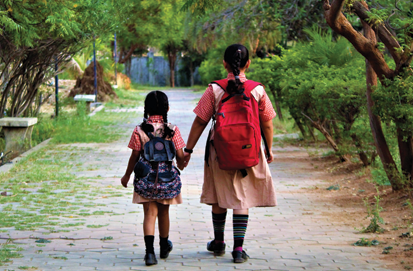A ‘how to’ guide for the development of school-based social accountability initiatives and an end-of-programme evaluation of Students acting for Honesty, Integrity and Equality (SHINE)
A ‘how to’ guide for the development of school-based social accountability initiatives and an end-of-programme evaluation of Students acting for Honesty, Integrity and Equality (SHINE)
About the SHINE programme:
Integrity Action’s Students Acting for Honesty, Integrity and Equality (SHINE) initiative works with young people (aged between 14-19 years old) to become monitors to identify and solve integrity problems in their schools.
With the support of local partners in each programme country, Integrity Clubs are established in secondary schools, with the aim to encourage the active participation of students at risk of exclusion in school issues. The clubs meet regularly and are supported by a focal teacher – or Integrity Club Patron – who delivers lessons and training on what it means to act with integrity. Integrity Club members are then provided with the opportunity to monitor issues in their schools, such as water and sanitation, teacher and student attendance and behaviour and the accessibility of school facilities.
Through monitoring local issues and working with school staff and local government officials, SHINE aims to empower young people to become agents of positive change and help achieve systemic change within education providers and the education system more broadly.
About the study:
Ecorys was commissioned by Integrity Action to develop:
- a user-friendly, student-led ‘how to’ guide on establishing school-based social accountability initiatives; and conduct
- end-of-programme evaluation, which aims to assess how far programme activities have enabled both intended and unintended outcomes for a variety of stakeholders across different contexts.
The two assignments are interlinked by the joint purpose of highlighting the voices and experiences of students and young people in a participatory way. Both assignments aim to maximise learning from the SHINE initiative to help inform the development of future initiatives to drive accountability in educational settings.
Research methods:
Participatory Action Research and Outcome Harvesting were the methodological approaches used to undertake both assignments. In-person primary data collection took place in three case study countries: Nepal, Palestine and Kenya, and was supported by a team of local researchers in the summer of 2021. The data collection consisted of participatory Focus Group Discussions with students, and Key Informant Interviews with teachers, school leaders, parents, local government officials and civil society partners.
In total, 176 stakeholders were consulted, including 122 students from 10 Integrity Clubs in Kenya, 7 in Nepal and 7 in Palestine. Analysis involved the use of RAG rating to assess the frequency of outcomes mentioned (by different stakeholders), the strength of evidence regarding SHINE’s contribution and the commonality of the outcome across all three countries.
Research outputs and key findings:
The how-to-guide incorporates ideas and lessons from Integrity Club members to help civil society actors, students, teachers, parents, and schools establish successful Integrity Clubs in their schools – or to take ideas and inspiration from this approach. Its key topics include reasons to create or join an Integrity Club, how to set up an Integrity Club, how to monitor through an Integrity Club and ideas around sustainability (how to keep an Integrity Club going).
The end-of-programme report discusses key findings in relation to expected and unexpected outcomes observed in the following stakeholder groups:
1. Changes in students and young people:
- The programme has significantly contributed to the empowerment of young people through the provision of training and opportunities to apply this training practically which has led to increased confidence and new knowledge and skills in students.
- The programme has significantly contributed to attitude and behaviour changes of students and young people, such as embodying the values of integrity and honesty and showing discipline and responsibility.
- The programme has, to an extent, contributed to students and young people being motivated and able to engage and influence various stakeholders (including peers, educational providers, duty bearers and wider community members) with varying success across contexts.
- Students showed behaviour changes at home as a result of the programme (an unexpected outcome).
2. Changes to educational providers: T
- The programme has increased the engagement and response from school management, teachers, and peers. T
- The programme has contributed to improved educational services by creating a better physical and learning environments in participating schools.
- The programme was unable to contribute to significant changes at a higher, policy level beyond the local school level due to its limitations in engaging more senior duty bearers and key civil society institutions.
3. Changes in the community:
- The programme has been associated with examples of change in wider public attitudes through enabling students to raise awareness in the community and improving public infrastructure and services.
- The programme lacked mechanisms around engaging the community more directly within its activities in schools and was therefore unable to contribute to community engagement with school governance issues.
- The programme catalysed the engagement of students in community and voluntary services (an unexpected outcome).
4. Changes to duty-bearers and civil society partners:
- The programme has helped to increase the engagement of local government officials with Integrity Club members to varying degrees across contexts (significantly in Palestine, moderately in Nepal, and to a limited degree in Kenya).
- The programme was limited in building sustainable capacity of civil society partners to advocate for anti-corruption and transparency in the education sector.
Conclusion:
The report concludes that the SHINE programme has been instrumental in achieving local impact. Through Integrity Clubs, students and young people have built knowledge and understanding of issues relating to integrity and have had opportunities to apply this learning practically within their schools and local community. Integrity Clubs have been a mechanism to bring students closer with other stakeholder groups, helping to build collaboration and trust. Similar programmes should focus on providing opportunities where students can act on knowledge acquired through training by offering monitoring programmes. However, beyond the individual and local level impact, SHINE has not consistently achieved its objectives, particularly in relation to policy change.
To catalyse anti-corruption and transparency measures, SHINE (and similar programmes that aim to contribute to policy reform) should prioritise investing resources and capacity building activities to local partners focused on high-level advocacy and lobbying work. Integrity Action recognised the need to identify partners with existing advocacy capacity during the design of the successor programme to SHINE (SHINE2); however, this will not be implemented due to funding challenges.
For more information please contact Mariya Yanishevskaya.

4 March 2022
5 minute read



